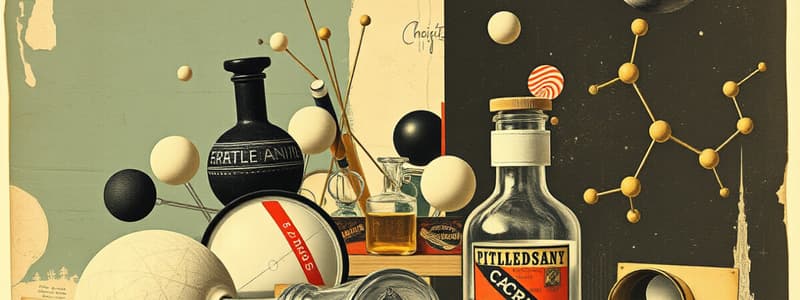Podcast
Questions and Answers
What are inorganic compounds?
What are inorganic compounds?
- Are relatively simple and do not contain hydrocarbon groups (correct)
- Include carbohydrates, lipids, and proteins
- Are made up only of water
- Are complex and contain hydrocarbon groups
What are organic compounds?
What are organic compounds?
- Are always simple in structure
- Include only water and minerals
- Are not necessary for life
- Are relatively complex and contain hydrocarbon groups (correct)
What is the chemical composition of water?
What is the chemical composition of water?
H2O
What are key functions of minerals in cells?
What are key functions of minerals in cells?
What are the basic building blocks of carbohydrates?
What are the basic building blocks of carbohydrates?
What are the basic components of lipids?
What are the basic components of lipids?
What roles do proteins play in cells?
What roles do proteins play in cells?
What is the function of nucleic acids in cells?
What is the function of nucleic acids in cells?
What is the role of Vitamin C in the body?
What is the role of Vitamin C in the body?
What is the function of Vitamin D?
What is the function of Vitamin D?
Flashcards are hidden until you start studying
Study Notes
Inorganic Compounds
- Simplistic structure, lacking hydrocarbon groups.
- Include essential substances like water and minerals.
Organic Compounds
- Complex molecular structure containing hydrocarbon groups.
- Comprises vital substances such as carbohydrates, lipids, proteins, nucleic acids, and vitamins.
Water
- Chemical formula: H2O.
- Serves as the medium for chemical reactions within organisms, facilitating metabolic processes.
- High heat capacity, stabilizing temperatures within cells.
Minerals
- Key elements include nitrogen (N), phosphorus (P), iron (Fe), and magnesium (Mg).
- Nitrogen is crucial for the synthesis of proteins and nucleic acids.
- Phosphorus aids in nucleic acid synthesis and is vital for cell membrane structure.
- Iron is an essential component of hemoglobin in red blood cells, enabling oxygen transport.
- Magnesium is integral to chlorophyll, necessary for photosynthesis in plants.
Carbohydrates
- Composed of basic building blocks called monosaccharides.
- Elemental composition includes carbon (C), hydrogen (H), oxygen (O), and nitrogen (N).
- Primarily provide a readily accessible energy source for cells.
Lipids
- Basic building blocks are glycerol and fatty acids.
- Composed of carbon (C), hydrogen (H), and oxygen (O).
- Serve as long-term energy storage and provide insulation.
- Structural components of cellular membranes.
Proteins
- Formed from amino acids, the basic building blocks.
- Elemental makeup includes carbon (C), hydrogen (H), oxygen (O), and nitrogen (N).
- Function as enzymes, catalyzing biochemical reactions, and play critical structural roles in cells.
Nucleic Acids
- Present in DNA and RNA, essential for genetic information storage and transfer.
- Composed of carbon (C), hydrogen (H), oxygen (O), nitrogen (N), and phosphorus (P).
- DNA holds genetic code; RNA is involved in the transcription and translation processes.
Vitamins
- Include essential compounds like Vitamin C and Vitamin D.
- Vitamin C is vital for preventing scurvy, while Vitamin D is essential for calcium absorption in bones.
- Vitamins play important roles in enzyme function, often acting as coenzymes.
Studying That Suits You
Use AI to generate personalized quizzes and flashcards to suit your learning preferences.




